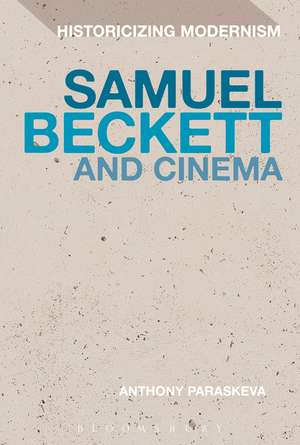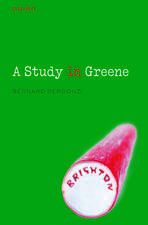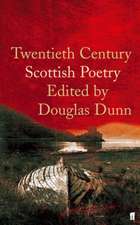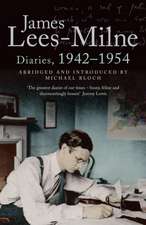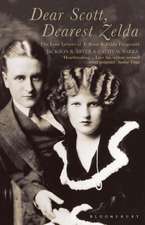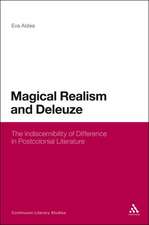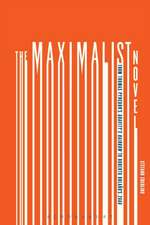Samuel Beckett and Cinema: Historicizing Modernism
Autor Anthony Paraskevaen Limba Engleză Paperback – 22 aug 2018
| Toate formatele și edițiile | Preț | Express |
|---|---|---|
| Paperback (1) | 236.27 lei 6-8 săpt. | |
| Bloomsbury Publishing – 22 aug 2018 | 236.27 lei 6-8 săpt. | |
| Hardback (1) | 714.12 lei 6-8 săpt. | |
| Bloomsbury Publishing – 22 feb 2017 | 714.12 lei 6-8 săpt. |
Din seria Historicizing Modernism
- 14%
 Preț: 540.31 lei
Preț: 540.31 lei - 30%
 Preț: 600.06 lei
Preț: 600.06 lei - 30%
 Preț: 602.11 lei
Preț: 602.11 lei -
 Preț: 447.42 lei
Preț: 447.42 lei - 30%
 Preț: 715.42 lei
Preț: 715.42 lei - 30%
 Preț: 509.93 lei
Preț: 509.93 lei - 13%
 Preț: 237.84 lei
Preț: 237.84 lei - 22%
 Preț: 259.07 lei
Preț: 259.07 lei - 13%
 Preț: 255.76 lei
Preț: 255.76 lei - 22%
 Preț: 777.06 lei
Preț: 777.06 lei - 22%
 Preț: 257.68 lei
Preț: 257.68 lei - 13%
 Preț: 257.97 lei
Preț: 257.97 lei - 13%
 Preț: 256.12 lei
Preț: 256.12 lei - 22%
 Preț: 258.59 lei
Preț: 258.59 lei - 13%
 Preț: 256.29 lei
Preț: 256.29 lei - 13%
 Preț: 258.42 lei
Preț: 258.42 lei - 30%
 Preț: 716.56 lei
Preț: 716.56 lei - 22%
 Preț: 232.34 lei
Preț: 232.34 lei - 22%
 Preț: 257.32 lei
Preț: 257.32 lei - 13%
 Preț: 228.85 lei
Preț: 228.85 lei - 30%
 Preț: 657.22 lei
Preț: 657.22 lei -
 Preț: 259.07 lei
Preț: 259.07 lei - 13%
 Preț: 258.42 lei
Preț: 258.42 lei - 22%
 Preț: 258.42 lei
Preț: 258.42 lei - 13%
 Preț: 257.03 lei
Preț: 257.03 lei - 30%
 Preț: 717.05 lei
Preț: 717.05 lei - 13%
 Preț: 256.20 lei
Preț: 256.20 lei - 22%
 Preț: 259.25 lei
Preț: 259.25 lei - 30%
 Preț: 773.81 lei
Preț: 773.81 lei -
 Preț: 237.75 lei
Preț: 237.75 lei - 13%
 Preț: 257.12 lei
Preț: 257.12 lei
Preț: 236.27 lei
Preț vechi: 304.97 lei
-23% Nou
Puncte Express: 354
Preț estimativ în valută:
45.22€ • 49.10$ • 37.98£
45.22€ • 49.10$ • 37.98£
Carte tipărită la comandă
Livrare economică 22 aprilie-06 mai
Preluare comenzi: 021 569.72.76
Specificații
ISBN-13: 9781350081611
ISBN-10: 1350081612
Pagini: 208
Dimensiuni: 156 x 234 mm
Greutate: 0.29 kg
Ediția:NIPPOD
Editura: Bloomsbury Publishing
Colecția Bloomsbury Academic
Seria Historicizing Modernism
Locul publicării:London, United Kingdom
ISBN-10: 1350081612
Pagini: 208
Dimensiuni: 156 x 234 mm
Greutate: 0.29 kg
Ediția:NIPPOD
Editura: Bloomsbury Publishing
Colecția Bloomsbury Academic
Seria Historicizing Modernism
Locul publicării:London, United Kingdom
Caracteristici
Draws on unpublished archives for the first comprehensive study of Beckett's engagement with cinema
Notă biografică
Anthony Paraskeva is Senior Lecturer in the Department of English and Creative Writing at Roehampton University, UK. He is the author of The Speech-Gesture Complex: Modernism, Theatre, Cinema.
Cuprins
Introduction1. Late Keaton, Docufiction, the Nouvelle Vague2. Self-Perception and Asynchronous Sound: Godard, Hitchcock, Resnais3. 'texte théâtre film': Auteurism, Meyerhold/Eisenstein, Duras4. Photogénie, the Close-Up, Gender PerformanceBibliographyIndex
Recenzii
By examining a vast array of early European films that Beckett is known to have seen from the 1930s onward, Paraskeva makes even Beckett's latest and shortest works shine with newly found intertextual brilliance . a truly remarkable contribution to Beckett Studies- especially in Paraskeva's intrepid research through loads of European films.
Paraskeva draws on a rich archive of existing scholarship in his book . Close analysis of Beckett's growing familiarity with the technologies, techniques and institutions of screen media helps it to make what may be the most detailed case yet for Beckett the serious cineaste.
Paraskeva successfully realizes the goal of exploring the various influences of first and second wave modernist cinema on Beckett's work and directing practice. Through his thorough, incisive, and engaging analysis and methodical comparison, Paraskeva provides us with a great read not only of Beckett's oeuvre but also of the other examples present in his research, and his diligently researched book should be considered necessary reading for anyone wishing to study Beckett's work for film and television.
A very solid and interesting addition to Beckett scholarship in an area that has been mostly overlooked.
There is ... a wealth of imaginative commentary here that makes for some productive and revealing scholarship.
Paraskeva's book succeeds in providing a fascinating account of Beckett's awareness of modernist film techniques and showing how he adopted them in his stage plays and teleplays. This monograph is clearly the product of a passion for modernist film culture, a thoughtful engagement with Beckett criticism, and a careful examination of Beckett drama in relation to film techniques.
A fascinating and impeccably researched study of the impact of first and second wave cinema on Beckett's writing and direction. [The book] allows the reader to completely reevaluate film history stratigraphically and non-chronologically through Beckett ... A must-read.
The sheer amount of material on offer in Samuel Beckett and Cinema, as well as the numerous connections drawn between Beckett's works and cinematic history, will ensure that any future studies on this subject will do well to begin here.
Paraskeva draws on a rich archive of existing scholarship in his book . Close analysis of Beckett's growing familiarity with the technologies, techniques and institutions of screen media helps it to make what may be the most detailed case yet for Beckett the serious cineaste.
Paraskeva successfully realizes the goal of exploring the various influences of first and second wave modernist cinema on Beckett's work and directing practice. Through his thorough, incisive, and engaging analysis and methodical comparison, Paraskeva provides us with a great read not only of Beckett's oeuvre but also of the other examples present in his research, and his diligently researched book should be considered necessary reading for anyone wishing to study Beckett's work for film and television.
A very solid and interesting addition to Beckett scholarship in an area that has been mostly overlooked.
There is ... a wealth of imaginative commentary here that makes for some productive and revealing scholarship.
Paraskeva's book succeeds in providing a fascinating account of Beckett's awareness of modernist film techniques and showing how he adopted them in his stage plays and teleplays. This monograph is clearly the product of a passion for modernist film culture, a thoughtful engagement with Beckett criticism, and a careful examination of Beckett drama in relation to film techniques.
A fascinating and impeccably researched study of the impact of first and second wave cinema on Beckett's writing and direction. [The book] allows the reader to completely reevaluate film history stratigraphically and non-chronologically through Beckett ... A must-read.
The sheer amount of material on offer in Samuel Beckett and Cinema, as well as the numerous connections drawn between Beckett's works and cinematic history, will ensure that any future studies on this subject will do well to begin here.
